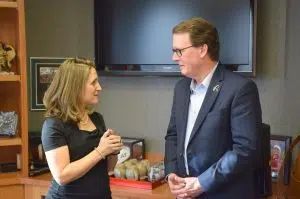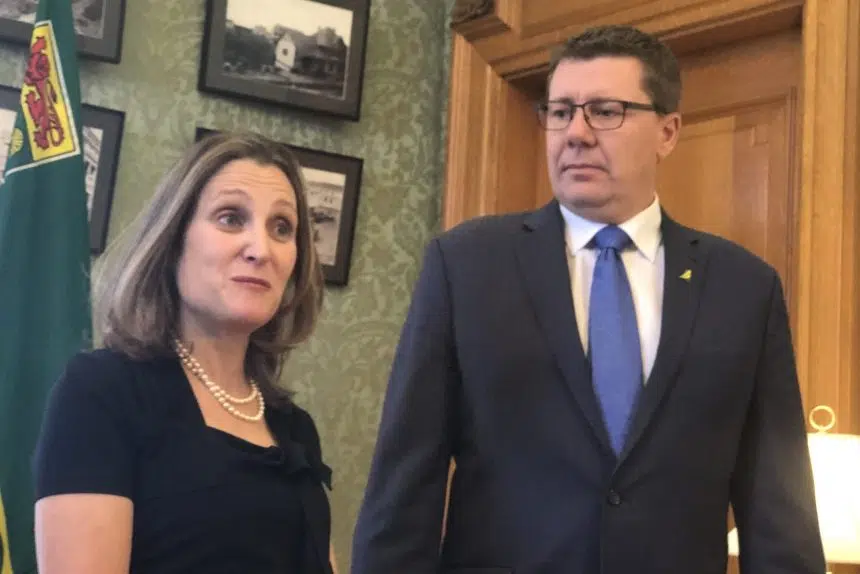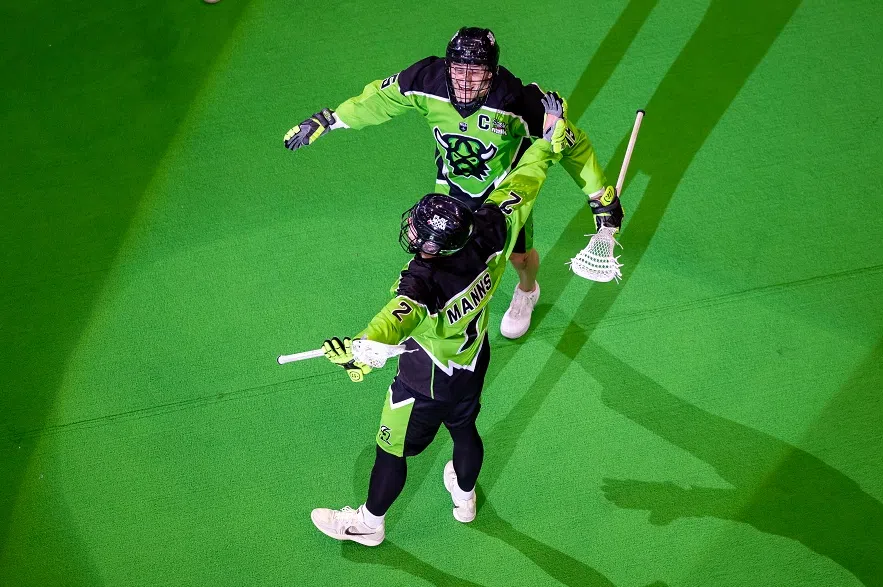Saskatchewan Premier Scott Moe says he had a more cordial meeting with Federal Intergovernmental Affairs Minister Chrystia Freeland than he did with Prime Minister Justin Trudeau.
Moe and Freeland met for nearly two hours in his Regina office on Tuesday, but Moe said no commitments were made on his list of requests to the federal government – including cancelling the federal carbon tax and reworking equalization.
He said that wasn’t the purpose of the meeting.
The visit was designed so Freeland could listen and get up to speed on what Moe said are challenges facing his province.
Moe described a meeting earlier this month with Trudeau in Ottawa as disappointing and said the province would be looking at ways to assert more autonomy.
He described his sitdown with Freeland differently.
“It was just a much more cordial meeting,” Moe said.
Freeland, also named deputy prime minister in Trudeau’s new cabinet, has been tapped to try and overcome regional tensions after the Liberals failed to win any seats in Saskatchewan and Alberta in October’s federal election.
The Alberta-raised politician met Monday in Edmonton with Alberta Premier Jason Kenney, who told her that there are real tensions in the country and Albertans want to be treated fairly.
Freeland said Moe was the first person she spoke with after the federal cabinet was sworn in last week. They discussed concerns over the Canadian National Railway Co. strike, which reached a tentative agreement before the Tuesday meeting.
“The people of Saskatchewan sent a message to our government on election day. And so I’m here to talk to the premier to look for common ground, and above all, to listen,” Freeland said before her visit with Moe.
Alex Lawrence, a spokesperson with her office, said the pair talked about the end of the CN strike as well as challenges in the energy sector, tackling climate change, pricing pollution, agricultural exports and innovation, and ratification of the new NAFTA.
Lawrence described the meeting as “productive.”
“Today’s discussion focused on how the provincial and federal governments can work together in the months ahead. As the deputy prime minister said, now is the time to listen to people’s concerns and priorities,” Lawrence said in an email after the meeting.
Moe said he and Freeland also talked about how to possibly work together on contentious issues like Bill C-69, federal legislation which overhauls the environmental assessment process for major infrastructure projects. Moe has dubbed it the “no more pipelines bill.”
“We feel there are some opportunities in the implementation of it to make it a better bill. But ultimately there’s going to have to be some changes to the legislation itself,” said Moe.
Trudeau’s minority government is in a position to reset its relationship with Saskatchewan, Moe said, and ultimately he wants to see changes coming from the federal government.
“I’m hopeful that they will do just that, but we will see in the days and weeks ahead.”
Regina mayor has his say
Prior to meeting Moe, Freeland visited with Regina Mayor Michael Fougere.
“The minister was here to listen,” Fougere told reporters. “She didn’t say a lot … She’s on a listening tour, if you will.”
Fougere listed a number of things he discussed with Freeland, including the feelings of alienation felt by people in Western Canada, the need for protection for the oil and gas industry, the construction of pipelines, and the topic of climate change.

Deputy Prime Minister Chrystia Freeland and Regina Mayor Michael Fougere met on Nov. 26, 2019. (City of Regina/Submitted)
That conversation turned to the carbon tax and its impact on the province.
“I just simply said that there should be or must be an equivalency between what the province is recommending and what the carbon tax is and a way to find a way to square that circle, to find a compromise between the two of them,” Fougere said.
The mayor also said he talked about infrastructure and the need for money to flow as quickly as possible from the federal government to cities to help pay for projects.
“We have many needs. Every municipality around the province has needs for infrastructure,” Fougere said. “We just don’t want to see delays.”
Fougere said Freeland has “a tall order” when it comes to unifying a country that was divided by the federal election. The Liberals’ showing in the election meant Trudeau had to find ways to get Western Canada representation in the cabinet.
Freeland’s tour is another tactic to hear from the region — and Fougere hopes his conversation will help Freeland understand the area’s concerns.
“I did mention to her that it’s important to listen, yes, but to act quickly,” he said. “The policies that (the Liberals) have either directly or indirectly have hurt Western Canada in many ways, so she must act and be seen to be acting and have some substantive changes that will redirect the conversation.”
Stephanie Taylor, The Canadian Press
— With files from 980 CJME’s Lisa Schick







